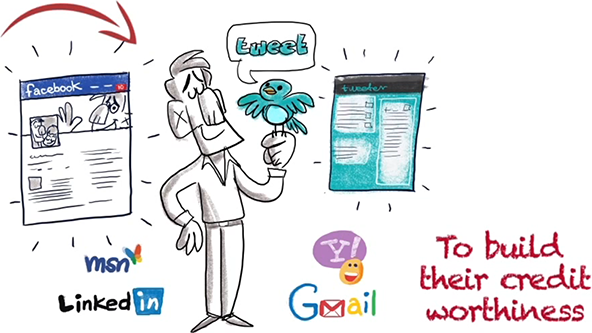Social Data Will not Replace FICO, but Will Improve Credit Scoring

Recently, Knowledge@Wharton posted a wide-ranging piece on the trendy issue of using social data for measuring potential borrowers’ creditworthiness. In it, the author skims over the offerings of three start-ups — Lenddo, Neo Finance and Affirm — which “hope to exploit a perceived shortcoming in traditional loan criteria based on FICO credit scores”. And whereas the author acknowledges that “incorporating social data for credit-scoring purposes is perhaps inevitable”, his / her skepticism is nevertheless palpable. Well, I think that the author’s skepticism is misplaced.
The main obstacles to using social data for credit-scoring purposes, as identified in the article, are privacy issues in relation to data collection, lenders’ reluctance to switch to a new metric when a perfectly well-functioning one (FICO) already exists and the potential for manipulating social signals. However, none of these arguments stands to scrutiny. Let’s examine them one at a time.
Privacy
Here is how Knowledge@Wharton frames the privacy issue:
Privacy is another issue. Last year, Germany’s largest credit agency, Schufa, sparked an outcry after several news outlets reported that it was planning to scrape data from social networks to gauge a consumer’s creditworthiness. It has since backed down. In the U.S., credit agencies are “tightly regulated,” Musto says. “They’re very careful to comply with the law…. I can’t see any of the big credit agencies getting into something like this.” At least one major lender, Citibank, does not see itself using social data to assess borrowers. Frank Eliason, head of social media for the company, told The Economist that the bank monitors social media for marketing but to use it to measure creditworthiness is a “dangerous game.”
Well, of course anyone who decides to do a wholesale scraping of people’s social profiles, for whatever purposes, is bound to hit a wall of resistance, both of the popular and regulatory kind. But the failure of one start-up to realize that fact does not invalidate the whole concept and plenty of other start-ups have been able to easily get around the privacy hurdle. How have they achieved that feat? Why, they have asked for permission. In fact, even one of the start-ups that are mentioned in the article — Neo — does precisely that. Neo’s software helps car-loan lenders determine whether or not an applicant’s claimed jobs are real by looking, with permission, at the number and nature of his / her LinkedIn connections to co-workers.
Similarly, Kreditech, a Hamburg-based start-up that makes small online loans asks applicants to provide a limited-time access to their account on Facebook or another social network on the assumption that much is revealed by one’s friends.
Then there is Finca International, an American microfinance firm which operates in Africa. With permission from potential borrowers, Finca analyses mobile phone usage patterns which it believes can help reveal those most likely to default.
Why Switch to a New Metric When FICO Is Doing a Fine Job?
Here is what Knowledge@Wharton has to say on the FICO replacement matter:
Then there is the natural reluctance of lenders to switch to a new metric when FICO has worked well. Other companies have introduced new scoring in the past, including the three largest U.S. credit bureaus, but these have been slow to gain ground. Credit start-ups using social data could face the same obstacles. “That’s going to be the hard part — prying customers away from FICO,” Stine notes. Challengers to FICO have to prove “they’re building a better mouse trap.” But companies will continue to try to wrest market share, especially now. “It’s a lucrative market … and the barriers to entry have gotten lower because of technology,” he says. “You don’t have to have a massive computer filling a house in order to do these kinds of things anymore. You can use a cloud server. The algorithms have gotten more sophisticated and do not need as much fine-tuning as they once did.”
Well, the author, or at least his / her sources are missing the whole point of using alternative data for credit-scoring purposes. The main objective is not the replacement of FICO or any other traditional credit-scoring model, but it is to expand on what already exists, so that more people can get access to various forms of financing (although yes, alternative data can and will eventually be used to paint a more complete picture of the creditworthiness of consumers who already have access to traditional lending). For example, the aforementioned Neo’s software is designed to use the information it obtained on LinkedIn (with the applicant’s permission) to calculate how quickly laid-off employees will be able to find a new job by rating their contacts at other employers.
Similarly, Kreditech goes through an applicant’s Facebook network (with permission) and examines the types of jobs held by his / her friends. ?áIf an applicant’s friends appear to have well-paid jobs and live in nice neighborhoods, he / she is deemed more likely to secure a loan and vice versa.
In the case of Finca, the company analyses (with permission) its prospective borrowers’ call patterns. For example, frequent calls to or from a rich country are a plus, as they suggest a connection with someone (possibly a relative) with a higher earning potential. Additionally, calls to a nearby market town are a plus as they suggest commercial activity.
None of the things these start-ups’ are doing are done by traditional credit-scoring providers. And whereas for the majority of loan applicants there are plenty of actionable data already available, these new-age models can be used (indeed, they are designed with that purpose in mind) to get some kind of an idea of the creditworthiness of consumers for whom there simply are not enough data.
Manipulating Social Data
Finally, here is what Knowledge@Wharton has to say on that issue:
Another problem with social data: Unlike actual payment history, it is easier to manipulate one’s social media profile. “[Consumers] can buy Twitter followers” and attempt to boost their credit scores that way, Stine notes. “At some point, it becomes advantageous to manipulate these things.” It then becomes a face-off between borrowers who manipulate their profiles to get credit and lenders who try to discern truly creditworthy consumers, he adds.
Yes, of course there is plenty of social profile manipulating going on, but the people designing the aforementioned services are perfectly aware of that fact and are building their software to take this type of fraud into account. To begin with, there is a number of free services that purport to be able to calculate the share of fake “friends” or “followers” (Status People immediately comes to mind). So we can reasonably expect that the best providers of alternative data for financial purposes will be able to do better than the free services, right? Well, that is precisely what another start-up mentioned in the Knowledge@Wharton piece happens to be doing. Lenddo’s software checks Facebook messages for shared slang or wording that suggests affinity among “friends”. And in any case, topics of conversation with fake “followers” are very limited by default and well-designed software should be able to easily identify such fake connections and take them out of the pool of evaluated data.
The Takeaway
Skepticism of the use of social data for the purposes of making financial decisions is fairly widespread, but it is misplaced. Lenders are a notoriously conservative lot and the Lenddos, Kreditechs and Neos of the world are not about to replace FICO in traditional lenders’ toolkits anytime soon. However, these new-age services are already finding some use at similarly new-age lenders in both developed and developing countries. Over time, as these platforms mature and improve their algorithms, they will gradually become accepted by the mainstream lenders, but even then the newcomers will not displace the traditional credit-scoring models, but will be used in addition to them. And I think that will make credit scoring more accurate.
Image credit: Lenddo.com.


